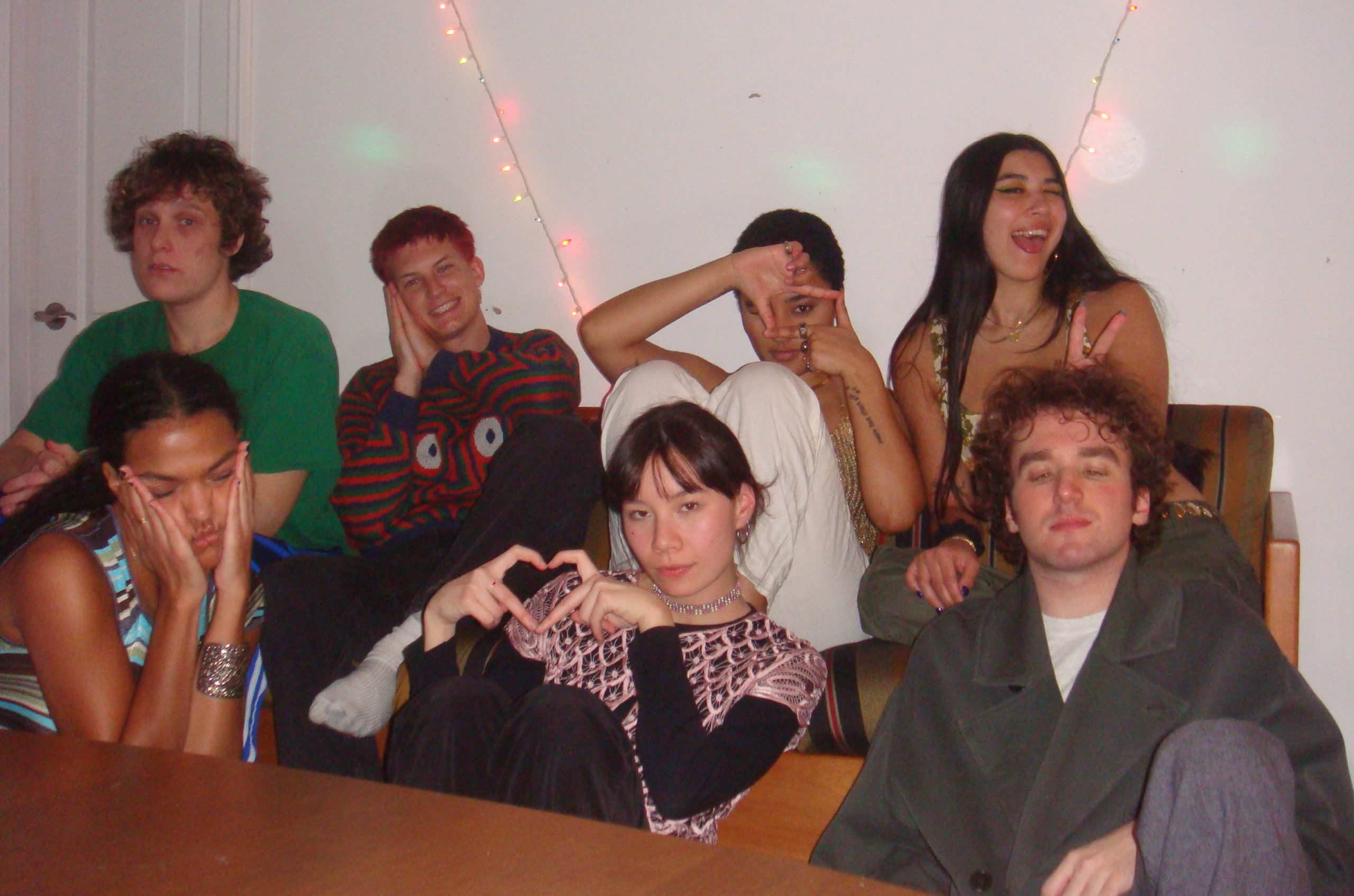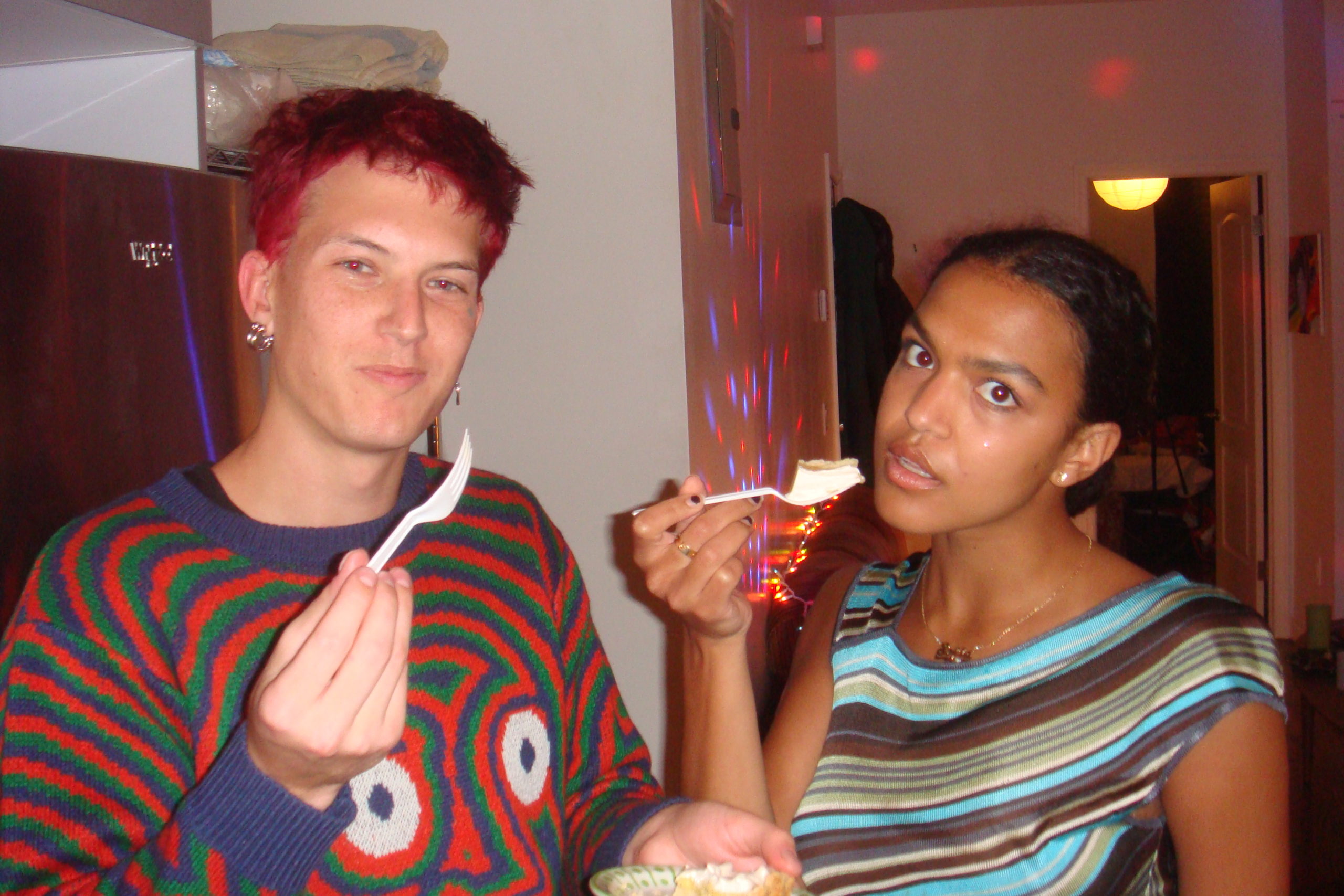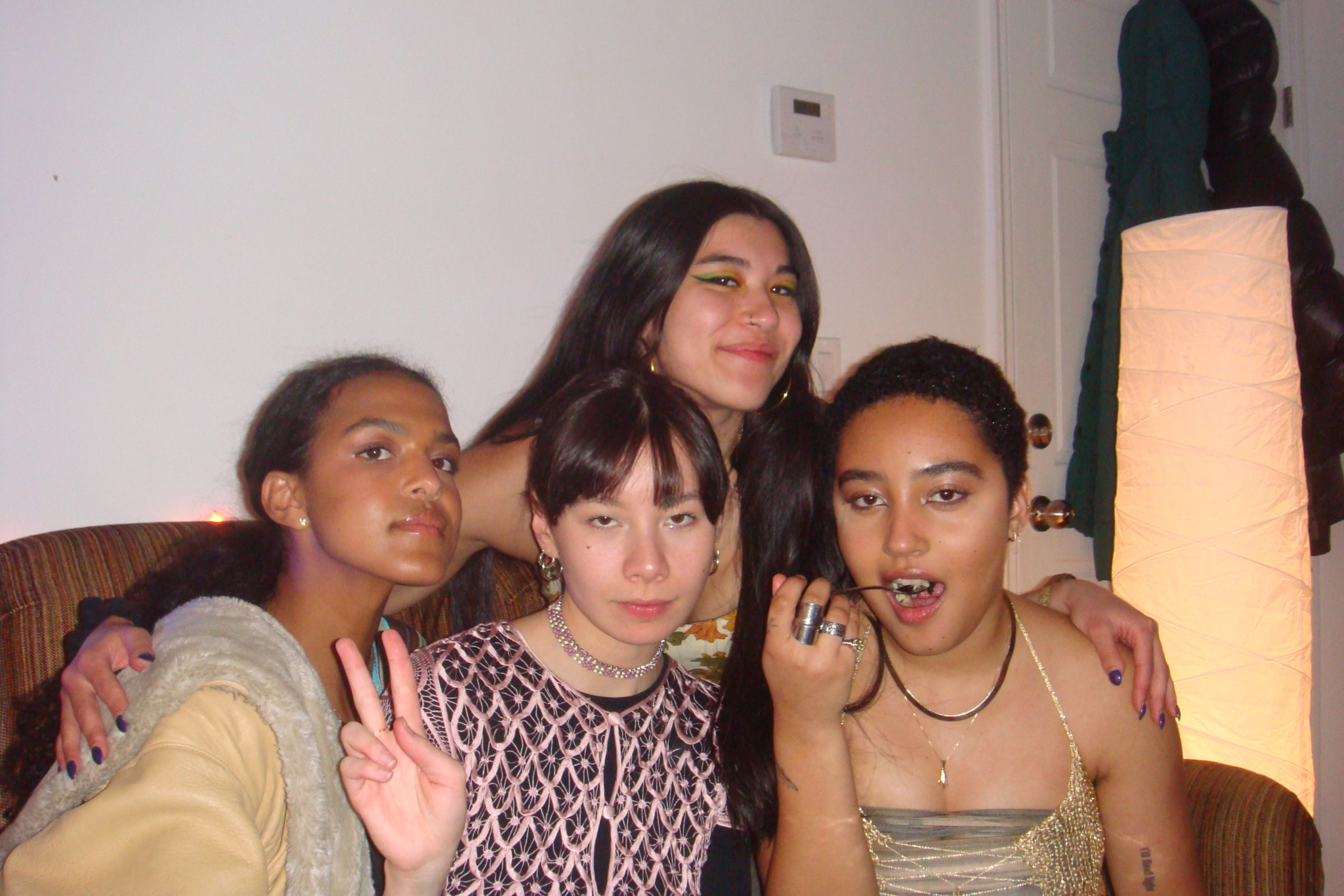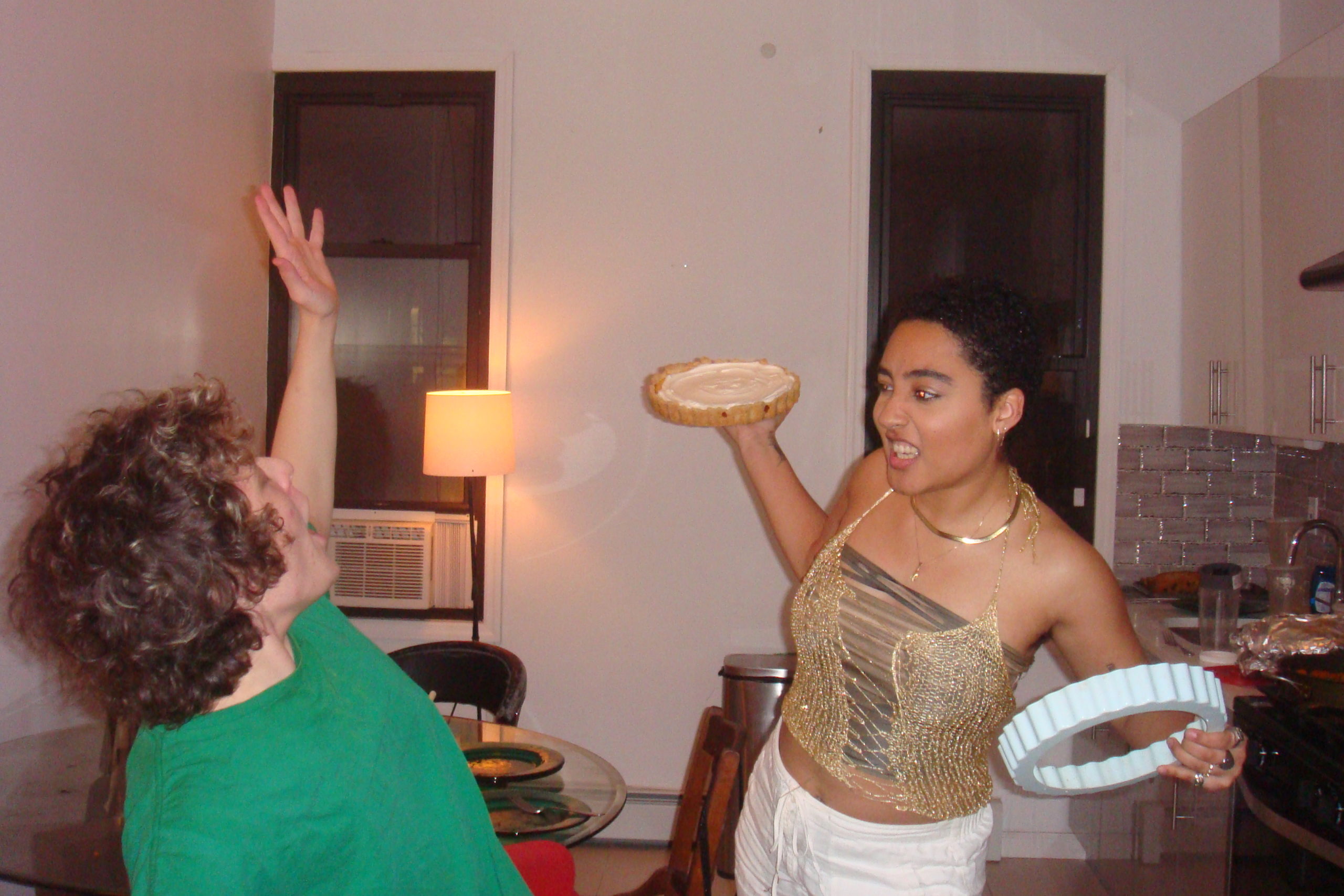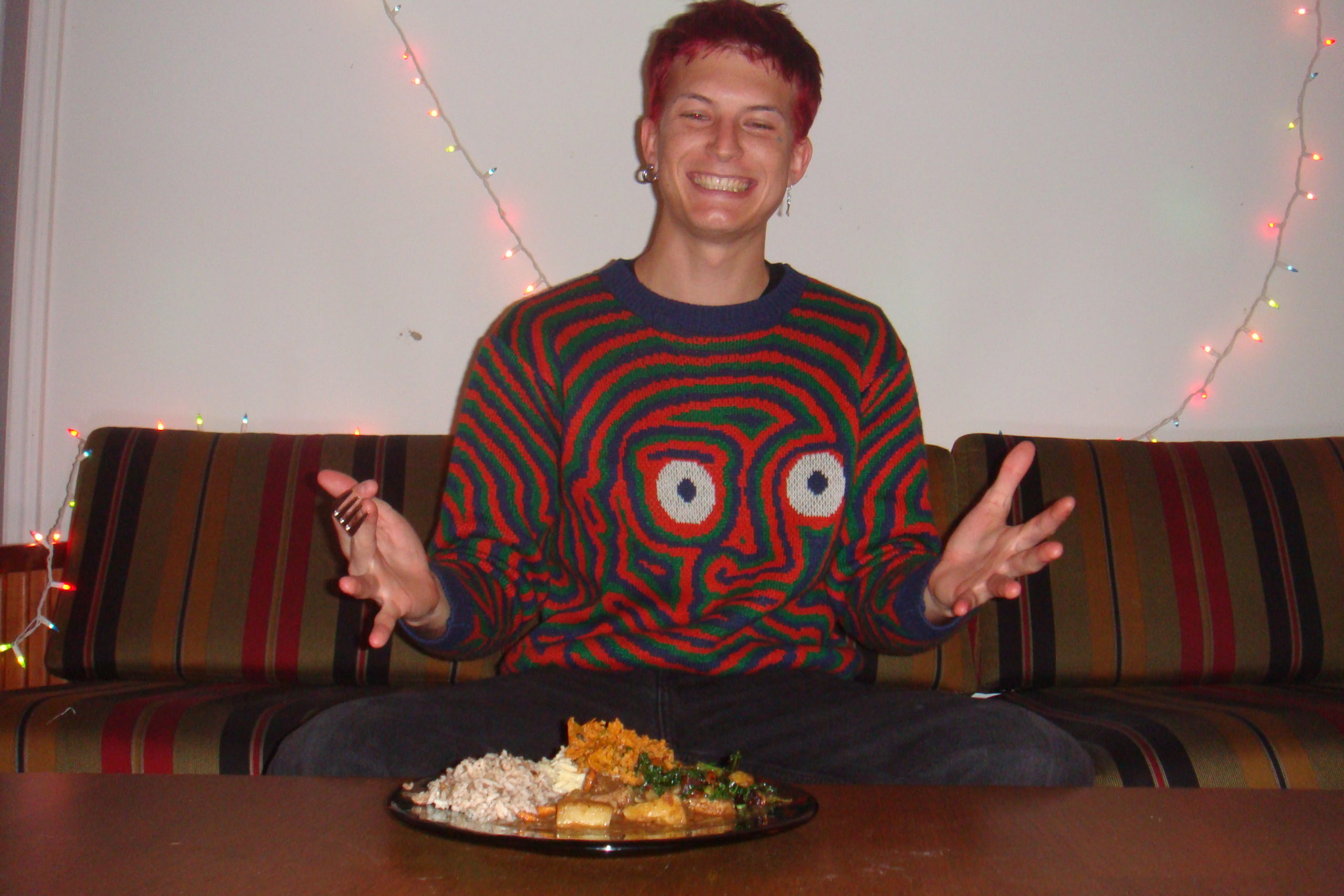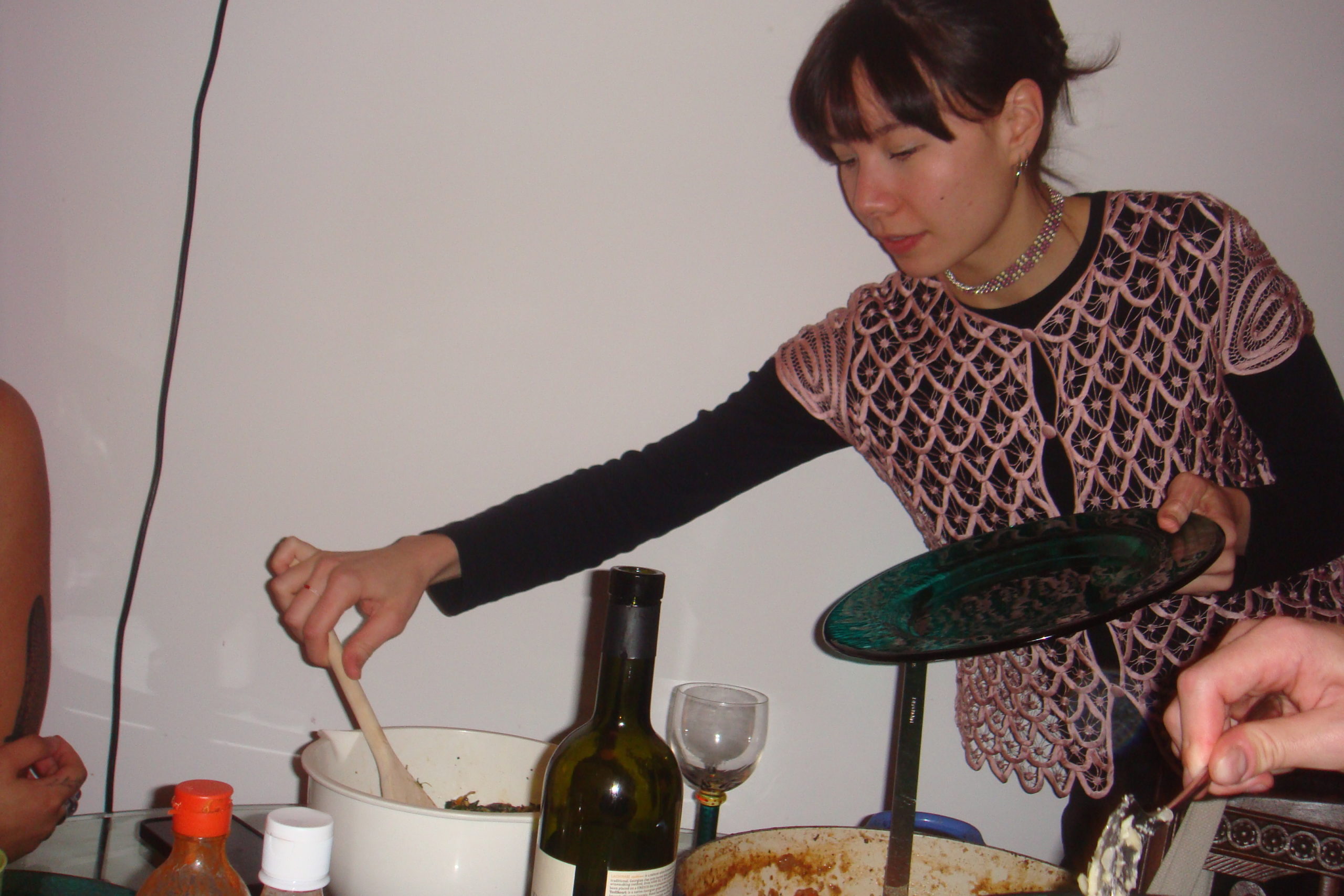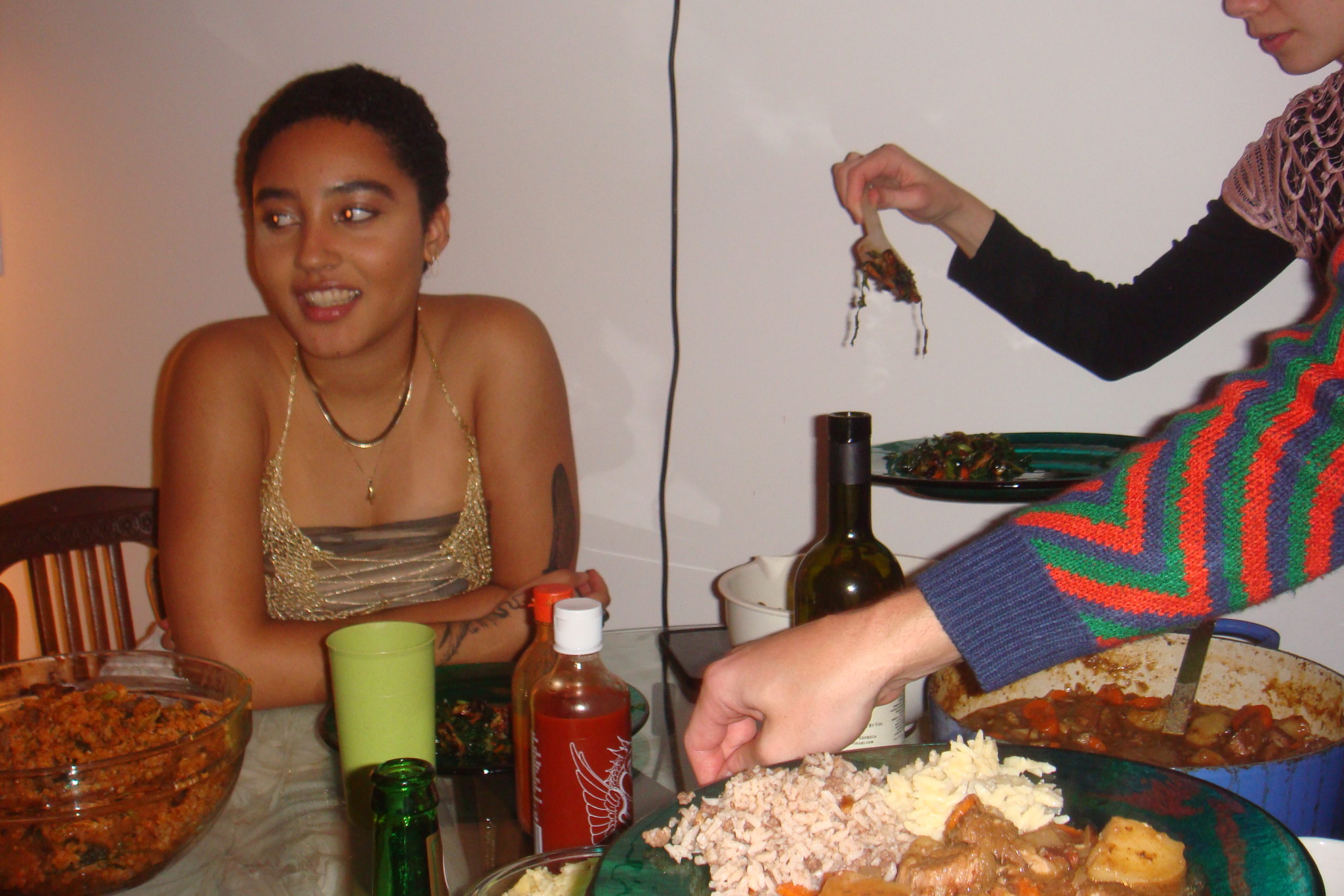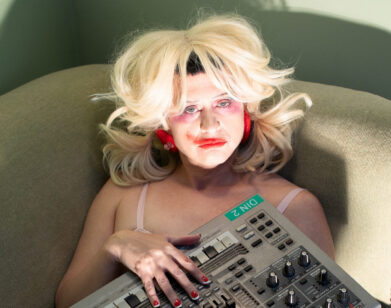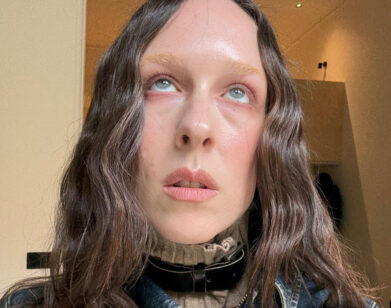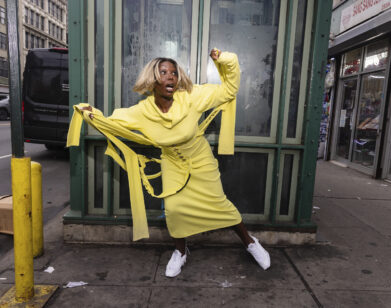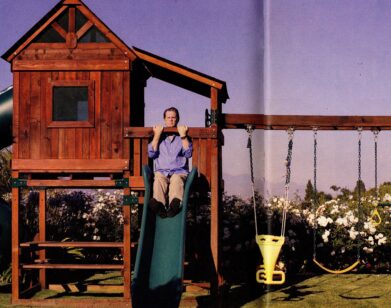Music!
MICHELLE and Gus Dapperton Have a Post-Tour Dinner Party
Late last year, Gus Dapperton and the alt-pop sixsome MICHELLE wrapped Dapperton’s 2021 Orca tour. On the road, MICHELLE’s dreamy tracks served as the perfect aperitif for Dapperton’s soft, synth-heavy songs. Now, after their long stint in a shared band, both acts are back in their native New York City, trading sound checks and suitcases for potlucks and cramped apartments.
With a few hundred thousand followers on TikTok and a song, “Supalonely,” that’s been used over six million times on the app, Dapperton appears poised for a mainstream breakthrough—or at least a spot on Spotify’s “Viral Hits” playlist. MICHELLE released their sophomore album, AFTER DINNER WE TALK DREAMS, on Friday, March 4th, landing them a gig as the opening act on Mitski’s sold out North American tour. To mark the album release, the friends and touring partners let us listen in on their dinner table conversation.
———
SOFIA D’ANGELO: All right. We’re here. Hi, I’m Sofia D’Angelo.
JAMEE LOCKARD: I’m Jamee Lockard.
JULIAN KAUFMAN: I’m Julian Kaufman.
GUS DAPPERTON: Hey, it’s Gus.
CHARLIE KILGORE: I’m Charlie Kilgore.
LAYLA KU: I’m Layla Ku.
EMMA LEE: This is Emma Lee.
LOCKARD: And you’re watching Disney channel. What did you cook for today, Gus?
DAPPERTON: I brought Hashweh, which is this Lebanese dish that my girlfriend makes all the time with lamb and rice and it’s one of my favorites.
KU: Why do you think your biggest song is your biggest, and why is one of your smaller songs small?
DAPPERTON: I think it’s mostly about timing. There’s been a little bit of compromise between that and what songs I actually think are good, but I think most of the time the songs I push harder end up being the bigger songs. Do you guys feel that way?
KAUFMAN: Actually, sadly, one of the things that I think makes or breaks a song is the tempo and the driving force. Our two biggest songs, “SUNRISE” and “THE BOTTOM,” both have driving base lines and drums which propel you through the song.
D’ANGELO: But “SUNRISE” works because it’s appropriate in so many situations. It’s a song that’ll literally satisfy every one of your needs as a music listener. There’s a captivating baseline, beautiful vocal performance, lush harmonies, great beat. But it’s also a song that you can have playing while you’re getting coffee, or while you have friends over and it won’t be too invasive. I think that kind of versatility in a song can give it a lot of bigness.
KILGORE: Also, the world that those two songs are painting is very accessible. Some of our smaller songs are more specific. Those you have to enjoy from the outside, as a listener, as opposed to being able to place yourself in the song.
KU: Okay. Is there a milestone you could reach that would make you feel like you have done everything you wanted to do as an artist?
KAUFMAN: No.
LEE: There are too many. At this point, everyone’s individual goals are kind of intertwined with the group goals in a way.
KILGORE: I guess my main goal at the moment is just to have a life where I make art all the time in different disciplines and have a really good time doing it. So I guess the milestone that I will reach is death.
DAPPERTON: I never really had any musical goals or dreams, but when I was growing up, I always wanted to pay my rent and move to the city, just to get away from everything. I was lucky enough to have that happen with music, but I never had any musical milestone.
KAUFMAN: I have one milestone and I think if I meet it I will feel accomplished in certain ways—I want to own all of the classic synths. The Jupiter 8, the CS-80, you know what I mean? I’ll get the Profit, the OB-X…
DAPPERTON: And the Minimoog.
KAUFMAN: And yes, I’ll get the Minimoog and the Rhodes Chroma. Once I get all of the classic synths, then I can just hang out in my studio all day. I won’t need to do anything at that point.
LOCKARD: I think if we were to be the musical guest on SNL or do like an NPR Tiny Desk, I would feel like, “Damn, we made it. We’ve established ourselves, we got a digital footprint that’s legit.” My most recent milestone was when I crowd surfed at the Brooklyn Steel show at the end of Gus’s set. That was just the highlight of my life so far.
KU: What aspects of your artistry are you least and most proud of?
KILGORE: The thing I am most worried about is my work ethic. I feel incredibly lucky to be in a band with some really driven, hardworking people. There’s a part of me that is sort of pleasure seeking and not super driven, and I’m glad that I have people in my life to reign that in.
LOCKARD: What I’m least proud of is my perfectionism. I’m an oil painter by trade and I’m used to the process of locking yourself in a room for weeks to work on three square inches of canvas until they look perfect. That is not at all how the songwriting process goes, particularly when you’re working with five other people. It’s been agonizing but necessary to surrender at times.
LEE: I’m not super down for change when it comes to writing. I’d like to work on that because we’re here to collaborate and our music needs to reflect all of us. As for what I’m proud of, I don’t think I’m the best at performing live, but I really like live shows, because I grew up dancing and performing, and I feel grateful to get to do that. I’m proud to, I don’t know, feel like myself when I’m in front of people.
D’ANGELO: I was going to say my weakness is lacking discipline, but if that’s Charlie’s weakness, then I’m literally a fraud. I don’t even know how I’m still here. But less about discipline than it is a lack of courage to commit to exploration. I play all these instruments, but I for some reason don’t allow myself to explore and have fun with them. One of my strengths is performing, and I feel really comfortable doing the work to get into my body and warm up and breathe, et cetera. Not eating dairy until after we get the take.
KU: What I’m least proud of is that I don’t write anything on my own ever. I freaked out before “FYO” came out, I freaked out before “Expiration Date” came out. Both of the songs did fine and now I feel fine, but I get very insecure about anything that I have a part in writing. But I’m really proud of my stage presence. I feel the most confident version of myself comes out on stage and I don’t know where she goes when I’m off stage.
DAPPERTON: So, what’s the sound of the 2020s?
LEE: I feel like hyperpop is big.
DAPPERTON: I feel if there is a sound right now, we can’t define it because we’re so used to what it sounds like. But also I feel like music, decade-wise and genre-wise, recycles itself every couple years. A lot of pop artists are kind of doing an ’80s thing, like the Weeknd, Miley Cyrus and Dua Lipa. I think that all recycles itself, and maybe the next decade will be a lot of ’90s.
KILGORE: I think a lot of those huge generational shifts in music have been driven by advances in technology. The ’80s was synths, and then the ’90s was sampling, and then the 2000s was digital recording. I don’t mean this in a bad way, but the music of the 2020s could be characterized by a lack of technological restraint, of being like, how do we go fucking crazy? How do we make these sound absolutely batshit bananas? I think hyperpop is the first answer to that question.
KAUFMAN: I’m being shortsighted when I say this, but I don’t really think that we’re at the cusp of another technological revolution in making music. I think what’s happening is we’re at a revolution in terms of listening to music. It used to be that music had to be mixed for the car, or mixed for the radio, or for the iPod. Now you see a lot of very low fidelity music, and not even in an artful way, things that are not well mixed, period. That might continue into the 2020s, a real lack of care in terms of the quality of mixing and the quality of recording. It’s kind of a degradation of the “fi” of anything.
KU: Do you think you hear your music differently than your audience?
DAPPERTON: I think everyone who makes music is always critiquing themselves and listening for what they should change. Not to say that it gives less pleasure when you listen back to it, but I definitely pay attention to parts instead of just letting it unfold.
KU: I don’t partake in MICHELLE listening. I don’t listen to our music on my own time and I don’t want to. And I say that because we spend so much time creating it. We spend so much time thinking about what we want to write about, writing about what we want to write about, producing it, recording it, recording it again. The joy in our music, for me, doesn’t come from listening to the final product. It comes from delivering it to people who want to dance with us and listen to us.
KILGORE: I think I do actually hear it in the way the audience hears it. When I’m working on a song, I’m constantly critiquing it. I know a song is finished when I start to actually hear it as I would hear any other song.
KAUFMAN: I had an experience with our song “Stuck On U.” It was my second year of college and I was at some random party sitting on a futon.
KILGORE: Did you put it on?
KAUFMAN: No, it just came on. I’m looking around the party and no one knows who the fuck I am, and no one knows what the fuck this song is. You know what I mean? No one’s connecting all these dots, this song is just playing at a party. And I’m looking around and everyone’s vibing out, and I realized, “Damn, this song kind of fucks.” I love being able to feel that empathic vibe of being in a room when people listen to your music without realizing that it’s your music. That’s rare.
D’ANGELO: What was the single most challenging moment of making your last record?
KILGORE: Who wrote this question?
KAUFMAN: This is definitely my question. The single hardest part of making this last album was hearing all of the songs change so drastically in the mixing process. It was very difficult for me to wrap my head around the sudden newfound identity that the song took on. Our mix engineer did an amazing job, but it was very difficult for me to listen to them for the first time and try to accept that someone else was kind of finishing the productions.
KU: I think picking the final track list was probably the hardest part for me. We had 50 songs that we had to whittle down to 14, and there are so many great songs that didn’t make the final album. It was just kind of exhausting and we all had to remove our egos, but these were our babies, and it was just difficult.
DAPPERTON: The hardest thing about sharing my last album with the world is I was more bold and vulnerable lyrically than I had been in the past. Usually I hide things under metaphors and all that, and I was more straightforward.
LOCKARD: Reading some of your lyrics is very Da Vinci Code, in a fun way.
DAPPERTON: I used to try to make them vague just to be poetic, and now I try to make them vague so that it’s still relatable. I never try to be too literal, because a lot of my favorite music is the stuff that I can place my own life into.
KU: What goes through your mind when you’re picking your show outfits?
KILGORE: How do I stunt on everyone else in MICHELLE?
D’ANGELO: You got to take a look at the city you’re in. You got to take stock of how you’re feeling personally, and have to have a sixth sense of the energy in the crowd and in the band.
LOCKARD: Being on stage has unearthed a new side of me. I really understand why Beyoncé is like, “I have Beyoncé and I have Sasha fierce,” On stage, I feel really emboldened to just take risks aesthetically and to hoe out a little bit because, I’m not going to lie, that’s a lot of fun. Being confident and sexy and talented with your friends is a great feeling.
KU: I like to look the most bisexual and the most badass possible. And I always build my outfits from bottom to top. So I pick my cargo pants for the day, my show pants.
LOCKARD: You do be talking about your show pants.
KU: I always spill food on my show pants. So I pick my show pants for the day and then I pick my top and then I match my makeup to my top. And I always do a jump test. I jump up and down and make sure that the girls are safe.
LOCKARD: They just want to be free. Let the girls hang out.
LEE: Is there anything you’d like to set the record straight on? Anything people assume about you based on your music or the image that you’ve created?
DAPPERTON: I feel people think I’m too cool for school or something, or unapproachable, but I love meeting fans. I can’t imagine anyone who doesn’t like meeting their fans because it’s like, you have the same taste in music and are all excited about it. I don’t share a lot of my life on social media, and I think that makes some people think that I’m scary or something, but I hope I don’t come off that way in real life.
KAUFMAN: I’d like to set the record straight that I know how to play more than three fucking chords. I think a lot of people listen to our music and they think it’s some simple shit.
DAPPERTON: Who thinks that?
KAUFMAN: I think a lot of people listen to the music and they think it’s this basic. I know all the chords. I can play all the chords.
LOCKARD: If there’s a chord, he knows it.
KU: I don’t know if I want to open the can of worms of the dreaded phrase “industry plant.” I don’t even know what that is, but—
DAPPERTON: I don’t think that’s a real thing. I think people just made that up. I wish there was someone who was just born to be a fucking curated, label-made pop star. Because that’d be crazy.
KILGORE: I think if industry plants were real, we would definitely be an industry plant.
LOCKARD: What? No, we wouldn’t.
DAPPERTON: None of us are very profitable.
LOCKARD: No. We’re the furthest thing from industry plant because we came together as a group of friends, right?
KILGORE: That’s what they want you to think. They just got 45 vaguely artsy-looking kids in a lineup. You, you, you—
DAPPERTON: I guess there are some K-pop bands who are probably created by execs watching people walk down the street.
LOCKARD: I would like to set the records straight on three things that I never want to answer ever again in my life. First, we are all from New York City. Second, none of us are named MICHELLE, and third, Sofia is not the Sofia from the Clairo song. I will never answer those questions again.
KU: Oh. And also for all you racists, Jamee and Emma are not sisters, and Sofia and I are not sisters. I’m so tired of hearing that.
D’ANGELO: And Charlie and Julian are not sisters—
KU: Like Jesus Christ, you’ve never met two half—
KAUFMAN: —But Jamee and I are lovers.
KU: But Gus and Ruby are siblings.
DAPPERTON: Yes. No one knows.
KU: The last question is, What’s your favorite memory from tour? Mine is karaoke! I loved learning that Gus’s karaoke song is “Best I Ever Had.”
LOCKARD: That was the biggest mindfuck of all time.
DAPPERTON: I wanted to do “Let Me Love You” by Mario, but I couldn’t find it. I love that song though.
KAUFMAN: I want to hear you sing Mario now.
DAPPERTON: We used to do that one as a cover. Wasn’t very good.
LOCKARD: I want to hear you hit that high note.
DAPPERTON: My sister does that part.
LOCKARD: Of course she does.
D’ANGELO: We saw a different side of everyone at karaoke—it was one of our first nights of the tour, it was a great bonding moment. Our tour manager, Rodney, fucking killed it. I think he was the MVP of the night.
DAPPERTON: Honestly for me the last night of the tour before you guys left was like the funnest night ever. We were just DJing and rolling really hard. We were just getting so emotional. It was the funnest shit.
KU: That was our favorite part too. Thank you. Remember when we were all rolling together?.
LOCKARD: At three in the morning. Looking for a gas station.
KAUFMAN: Here’s a question for Gus. What’s your favorite Gus song and what’s your favorite MICHELLE song?
DAPPERTON: My favorite MICHELLE song at the moment is “POSE.” I really like that one. I really like that it starts on the minor three chord because it’s so confusing. It feels like it’s the end of a loop of a chord progression, but it’s the start, and that’s really sick. My favorite Gus song….I don’t know. I always say “Medicine” off my last record.
KAUFMAN: If you could combine a MICHELLE song and a Gus song, what songs would they be? What would that offspring be called?
D’ANGELO: “Pose humorous.”

